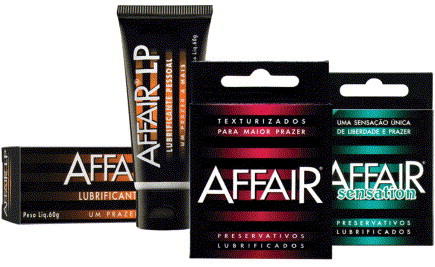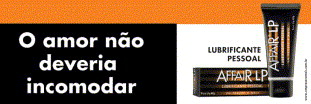Abstract
DKT International is a non-profit social marketing enterprise whose mission is to provide safe, affordable options for family planning and STI/HIV prevention. In Brazil, DKT sells male and female condoms to mostly lower-income couples nationwide. This paper is about the introduction of a ribbed, lubricated, latex condom called Affair® to the Brazilian market in 2000. Sales were initially very low, but based on reports that Affair was well liked by some men who have sex with men, we took the opportunity to give Affair that positioning. We worked with our advertising agency, a local research company and Dignidade, a Brazilian NGO working for the rights of men who have sex with men. Two new products – a baggy condom called Affair Sensation and a complimentary lubricating gel called Affair Personal Lubricant – with new packaging and a promotional campaign were launched in February 2006. The billboard advertisement generated controversy in São Paulo, where the Advertising Council required it to be taken down due to complaints. However, the controversy helped promotion and at the same time generated public debate on sexuality and human rights. Our overall experience has been positive, sales are up and we have received messages of support for the products and their promotion from consumers.
Résumé
DKT International est une entreprise de marketing social à but non lucratif dont la mission est d’offrir des options sûres et abordables de planification familiale et de prévention des IST et du VIH. Au Brésil, DKT vend des préservatifs masculins et féminins, principalement à des couples à faible revenu. Cet article décrit l’introduction d’un préservatif en latex lubrifié et rainuré appelé Affair® sur le marché brésilien en 2000. Les ventes ont démarré très lentement, mais après avoir constaté qu’Affair plaisait à certains hommes ayant des rapports avec des hommes, nous avons décidé de nous positionner dans ce segment. Nous avons travaillé avec notre agence de publicité, une société locale de recherche et Dignidade, ONG brésilienne qui défend les droits des hommes ayant des rapports sexuels avec des hommes. Deux nouveaux produits, un préservatif « confort » (Affair Sensation) et un gel lubrifiant complémentaire (Affair Personal Lubricant), avec un nouvel emballage et une campagne publicitaire, ont été lancés en février 2006. Les panneaux publicitaires ont suscité une polémique à São Paulo, où l’Office publicitaire a demandé leur retrait en raison de plaintes. La controverse a cependant aidé la promotion tout en stimulant le débat sur la sexualité et les droits de l’homme. Dans l’ensemble, notre expérience est positive, les ventes progressent et des consommateurs nous ont adressé des messages de soutien.
Resumen
DKT International es una empresa de mercadeo social sin fines de lucro, cuya misión es proporcionar opciones seguras y a precios asequibles para la planificación familiar y la prevención de ITS/VIH. En Brasil, DKT vende condones masculino y femenino en toda la nación, principalmente a parejas de bajos ingresos. Este artículo trata sobre el lanzamiento de un condón de látex lubricado y estriado, llamado Affair®, en el mercado brasileño, en 2000. Inicialmente, las ventas eran muy bajas, pero Affair fue muy bien recibido por algunos hombres que tienen sexo con hombres. Entonces, aprovechamos la oportunidad de posicionar a Affair de esa forma. Trabajamos con nuestra empresa de publicidad, con una empresa local de investigación y con Dignidade, una ONG brasilera que trabaja por los derechos de hombres que tienen sexo con hombres. En febrero de 2006, se realizó el lanzamiento de dos nuevos productos: un condón holgado llamado Affair Sensation y un gel lubricador Affair Personal Lubricant, con una nueva envoltura y una campaña promocional. La cartelera publicitaria generó polémica en São Paulo, donde el Consejo de Publicidad exigió que se quitará debido a las quejas. Sin embargo, la polémica ayudó a su promoción y además suscitó debate público sobre la sexualidad y los derechos humanos. En general, nuestra experiencia ha sido positiva, las ventas están en alza y hemos recibido mensajes de apoyo.
DKT International is a non-profit social marketing enterprise whose mission is to provide couples with safe, affordable options for family planning and STI/HIV prevention. Begun in 1984, DKT was able to serve more than 11 million couples in Latin America, Asia and Africa in 2005 at the low cost of US$2.50 per couple served. For over 20 years, DKT International has made effective use of private sector marketing techniques and networks to deliver HIV prevention products and services and family planning (including male and female condoms, hormonal methods, emergency contraception, IUDs and other clinical methods). Not just a marketing company, DKT has demonstrated expertise in NGO partnerships, policy change, advocacy, social franchising and contraceptive security. In 2005, DKT International again received a Charity Navigator 4 Star rating for effectiveness in programming (see <www.dktinternational.org> for more information).
In 1990, DKT International was invited by the São Paulo Health Department to initiate a condom social marketing programme. With initial support from the International Fund for Health and Family Planning, and subsequently from USAID, the social marketing programme began to provide lower-income couples nationwide with high-quality, affordably priced male and female condoms, along with much needed media information and condom promotion campaigns.
Social marketing bridges the gap between the public and private sectors by using private sector distribution networks and techniques to deliver products and services which are affordable for lower-income populations. An important policy initiative from DKT was to lobby State and Federal lawmakers in Brazil to reduce taxes on condoms, which have fallen from a high of 70% to about 10% today. This has resulted in much lower consumer prices. Whereas in 1990, a single condom cost almost US$1, today the average price is one-third of that. This was the direct result of lower taxes and increased competition. At the same time, the Brazilian government through the Ministry of Health has been very supportive of AIDS prevention activities and has actively promoted the use of condoms for many years. The outcome has been the growth of the Brazilian condom market from around 50 million pieces per annum 15 years ago, to around 750 million pieces in 2006 (AC Nielsen and Ministry of Health data).
Affair® condoms were launched in Brazil in 2000 as a higher-priced condom in order to help subsidise the lower-priced, socially marketed Prudence® brand. It was felt that a higher price would be acceptable because of the novelty of the product – it had texture in the form of raised ribs along the length of the condom. The product was originally targeted to upscale, young urban males, using advertisements in vehicles such as Playboy magazine.
After a couple of years, the brand had not lived up to expectations, and each year was selling less. However, reports kept coming in from the field that Affair was being purchased by men who had sex with men, who had tried the product and liked it. We wondered if we had an opportunity as no other brands were positioned to appeal to men who had sex with men in Brazil. We also knew from our research that men who identified themselves as homosexual or bisexual had more partners and used more condoms than those who identified as heterosexuals. A study by Sinal Pesquisas in June 2003 showed that men who identified as homosexual or bisexual had had an average of 14 partners in the previous year and “always or usually” used condoms for sex 85% of the time. This was compared to an average of four partners for men who identified as heterosexual who said they used condoms “always or usually” 58% of the time. This study took place in São Paulo, Belo Horizonte and Porto Alegre with 1,200 interviews of young middle-income men, 18–40 years of age, 25% of whom identified as homosexual or bisexual.
In Brazil, it is easy to reach young, urban men who have sex with men with messages because of the availability of magazines, radio and television programmes that target men with alternative lifestyles. Rather than discontinuing the brand, we decided to change the target consumer to young, sexually active, urban men who have sex with men with middle to high incomes.
This move necessitated a change in the advertising and the advertising media. The original advertisements had a photograph of a heterosexual couple. The new ones made the product the focal point. The first advertisement compared a plain condom with an Affair condom using plain apple pie in contrast to apple pie with ice cream on top. Above them both was the headline: “What’s good can always be better”. This was repeated in other advertisements with variations such as a cup of black coffee beside a cup of cappuccino.
We placed the ads in G Magazine, an explicit pictorial magazine for men who have sex with men. We also sponsored the late night television programme “Late Night With Monique Evans”, a favourite of the gay community. At some point during the broadcast, Monique would give a demonstration of the product in a “live” product endorsement, opening a pack of condoms and unrolling a condom onto a dildo, and then showing a close-up of the textured rings as she rubbed her hand up and down on the dildo and described the textured sensation.
Within a year of the re-launch, the sales slide had stopped and actually begun to pick up. While we were now moving toward positive territory with the brand, we felt we could do more. In 2005, our manufacturer, Karex Industries, informed us of a new style of condom that they had developed in their Malaysian plant, which had more room at the closed end – called by manufacturers a “baggy” condom, since it is loose fitting like a “bag”, not tight like most “male” condoms. This condom allows for more friction to occur between the sensitive part of the penis under the head and the condom itself, and hence far more pleasurable sensations. The product also had a ribbed texture, so it was only logical to think that this product would make a natural line extension for Affair. We decided on adding the word “Sensation” directly beneath the brand logo to emphasise the difference. We also developed a water-based lubricant to introduce at the same time – Affair LP (Lubrificante Pessoal, or Personal Lubricant) ().
While we were preparing to introduce these new products, In-Search of São Paulo conducted a research survey for us on condoms in the four largest cities of Brazil, São Paulo, Rio de Janeiro, Belo Horizonte and Porto Alegre, in August 2005. A structured questionnaire was used. Of the 2,000 men who responded, 400 self-identified as homosexual or bisexual, 100 from each city. The research confirmed that 80% of Affair consumers were men who have sex with men. The men were sexually active, heterosexual, homosexual or bisexual men, aged 18-35 with middle incomes. The aim was to understand their sexual behaviour, to identify condom purchase intentions, usage and behaviour, to verify the importance of condom brands and identify the acceptance and barriers to use of condoms.
The research also confirmed that those who self-identified as homosexual or bisexual had more sex partners than those who self-identified as heterosexual – an average of 11 partners vs. six partners (in the previous 12 months), and they used condoms “always or usually” 85% of the time vs. 64% of the time for the men who identified as heterosexual. Furthermore, the men who identified themselves as homosexual and/or bisexual had a more receptive attitude towards condoms, were more convinced of their effectiveness, more interested in diverse product features, such as aroma, texture and shape, much better at sharing information with friends and co-workers about condoms and tended to be brand loyal.
Before the launch, though, we wanted to test some new advertising modalities. We work with an NGO in Curitiba, called Dignidade. Dignidade is a civil rights advocacy organisation with many years of experience working with GLBT (gay, lesbian, bisexual and transgender) rights issues. They helped us to recruit volunteers for four focus groups of 8–12 each, of men who have sex with men with the same age and socio-economic status as participated in the survey, who were willing to discuss condoms and to evaluate some advertising executions. Each group had a facilitator, an observer and a note-taker. Each session lasted about two hours. The facilitator followed a rough outline of the areas to discuss, including condoms and lubricants in general, advertising in general, and then more specifically concerning knowledge and attitudes toward particular brands, and reactions to storyboards made up specifically for the group’s evaluation of the proposed Affair products.
What we heard from the focus groups was that they wanted the advertising campaign to focus on positive things like pleasure, respect and a healthy lifestyle. They didn’t want to hear about diseases. They felt that the campaign should feature real people in real situations, not cartoons or caricatures, and certainly not stereotypes. They hoped not to be portrayed only as hairdressers, as often happens in Brazilian soap operas. Finally, they hoped for a sexy advertising campaign, because they thought that condom use should be sexy.
The resulting advertising campaign focused on the target consumer rather than the product and its features. This was a “lifestyle” approach, much like that used by cologne and perfume marketers. We developed materials for magazines, point-of-sale, samplers, the internet and billboards. The campaign would revolve around the twin themes of “Pleasure” () and “Freedom” (), and featured two different models in each execution.
Affair Sensation and Affair LP were launched nationwide in February 2006, with the advertising concentrated in São Paulo and Rio de Janeiro. The response from the public was swift. We received many letters and e-mails of congratulations for the new campaign and many requests for the products, amid a few negative responses from people who felt the campaign was offensive or who simply didn’t like the subject matter:
“Congratulations! Great ad!” (Ari)
“Only with ad campaigns like this will we be able to overcome intolerance.” (Renato)
“Congratulations on the ad! I wasn’t aware of your product before, but I’m going out to buy it now.” (Leonardo)
“Your advertisement is disgusting. I will never use your product and I will speak badly of you for the rest of my life. Go to hell.” (Roberto)
Our initial elation was short-lived however, because soon after the outdoor advertising appeared in São Paulo and Rio de Janeiro, it was taken down by the sign company in São Paulo. When asked why they took the billboards down, they cited an order that came from the Advertising Council saying they portrayed “inappropriately excessive public sensuality”. This charge seemed quite out of place, especially considering that we were in the month of February, Carnival month in Brazil, when “public sensuality” could be seen on many street corners without offence being taken. The Advertising Council, while purporting to be sympathetic, claimed their hands were tied since they had received complaints from consumers (there needs to be only one complaint, and we were supplied with copies of three e-mail complaints attached to the citation which obliged us to remove the advertising). They said they were bound by their rules to have the offending materials removed until a hearing could be convened to consider the validity of the complaints.
Over the course of the next few days, local newspapers, TV, radio and especially the internet in São Paulo and Rio de Janeiro covered the story with photos of the “offensive” billboards, interviews with DKT company spokesmen, Advertising Council members, local politicians and advertising experts. In the main, these depicted the action of the Advertising Council and the local São Paulo government as undue censorship and discrimination. The public weighed in through blogs and letters to the editor both for and against the advertisement. While public support for our advertising was both heartening and appreciated, it was indeed dismaying to receive negative responses to our efforts, especially some of the more vile letters we received. Nevertheless, we welcomed the free publicity for the brand and the healthy public debate on human rights which was generated by the controversy. We replaced the billboard advertising that was taken down soon afterwards with another (). Besides being apt for the product we were advertising (lubricant), it was a subtle jab at the narrow-mindedness of some of our detractors.
The Advertising Council hearing took place four weeks after the original advertising campaign was abruptly removed and resulted in the Council approving the advertisement itself, but prohibiting it being used in outdoor settings, so as not to “offend the feelings of people who do not agree with the advertisement”. No appeal was made.
By listening to our target audience, we were able to develop an effective media campaign to reach our consumers. Even though it did generate some negative reactions, we believe it was worth taking a chance on what some might consider a risky communications strategy. Although it is still too early to measure the long-term success of the product positioning and advertising, indications after just a few months are very positive and point to increased product sales (up 33% in 2006) and an even more optimistic forecast for the future of the Affair brand in Brazil, with sales projected to double by next year.
Acknowledgements
A version of this paper was presented at Condoms: An International Workshop, in London and Brighton, 21–23 June 2006.



